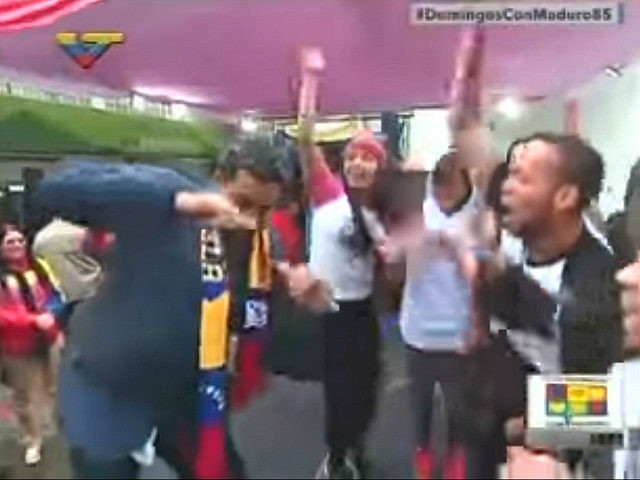The anti-socialist opposition in Venezuela called for daily protests following the “mother of all marches” last week, and angry Venezuelans appear to have heeded the call, defying increasingly violent repression tactics from the Bolivarian National Guard (GNB).
President Nicolás Maduro has responded to the protests by attempting to return to business as usual, performing a “hip-hop” dance on national television and launching an educational initiative titled, “Urban Salsa Heart.” Maduro is the host of a weekly television show called Sundays with Maduro and the radio program Salsa Time.
In central Carabobo, protesters stormed a statue of late dictator Hugo Chávez Tuesday night, burning it to a crisp. While the statue remained standing after the incident, it was significantly damaged, photos showed.
#24Abr 11:30pm PlazaItalia en #Mariara, estatua de Chávez fue incinerada #Carabobo pic.twitter.com/djt546QY9h – @RRL_36
— Reporte Ya (@ReporteYa) April 25, 2017
#25abr Asi quedó estatua de Chavez en Mariara, Carabobo. pic.twitter.com/x4I3GTZUL8
— wilovar (@wilvarela64) April 25, 2017
The incident recalls a similar protest in far western Táchira state during the 2014 protests, in which protesters beheaded a statue of Chávez in a public square, objecting to the arrest of opposition leader Leopoldo López. López remains in prison serving a 14-year prison sentence for having organized peaceful protests that year.
The latest wave of protests began this month following an attempt by the Supreme Court to usurp legislative authority from the National Assembly, currently controlled by the opposition.
While the Supreme Court nominally reversed the decision, the government has acted to keep legislators from doing their jobs and vetoed major legislation to liberate political prisoners and eliminate socialist policies. The government also recently banned Miranda state governor Henrique Capriles Radonski, a two-time opposition presidential candidate, from holding public office for 15 years.
On Wednesday, another opposition party official, Popular Will organizer Franklin Gómez Ruiz, was arrested in Táchira, according to the Venezuelan newspaper El Nacional, for “terrorism.” El Nacional is the largest domestic publication covering the opposition on the ground without a pro-socialist bent and has paid the price for it.
The newspaper announced on Wednesday that Ayatola Núñez, one of its reporters, was seriously injured when a tear gas canister hit him in the head while covering a protest.
Maduro has used television in the past to condemn protesters seeking free and fair elections and the liberation of political prisoners. On Sunday, however, he dedicated part of his television program to urban and hip-hop culture, joining young performers for a dance.
The broadcast appears to be part of an initiative called “Salsa and Urban Heart,” meant to unite musically talented youths at universities to “express our rebellion.” The move appears intended to counter the heated student protests against the government, distracting young people from politics with music and dance. Maduro told students at an event to launch an initiative to perform on the streets. “Where Chavismo is in the streets, there will be peace,” he said.
Outside of urban dance initiatives, the Venezuelan government threatened this week to leave the Organization of American State (OAS) over the group’s repeated demands that Venezuela adhere to the democratic order. The OAS has begun preliminary discussions on exerting its authority to limit Venezuela’s membership in the group. Should the meeting occur, Foreign Minister Delcy Rodríguez warned, Venezuela would begin the process to leave the group.
As Venezuela has currently run afoul of the democratic order, limiting the National Assembly’s legislative power and refusing to hold elections, the country has actually provided the OAS with grounds for suspension. The organization has a democratic charter which states:
When the special session of the General Assembly determines that there has been an unconstitutional interruption of the democratic order of a member state, and that diplomatic initiatives have failed, the special session shall take the decision to suspend said member state from the exercise of its right to participate in the OAS by an affirmative vote of two thirds of the member states in accordance with the Charter of the OAS. The suspension shall take effect immediately.
Nations formerly allied with Venezuela – including Argentina, Brazil, and Peru – have voted for center-right governments within the past two years, leaving the socialist Venezuelan government with few allies in the OAS.

COMMENTS
Please let us know if you're having issues with commenting.